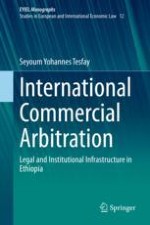2021 | OriginalPaper | Buchkapitel
2. Arbitration Agreement: Validity, Lapse and Interpretation
verfasst von : Seyoum Yohannes Tesfay
Erschienen in: International Commercial Arbitration
Aktivieren Sie unsere intelligente Suche, um passende Fachinhalte oder Patente zu finden.
Wählen Sie Textabschnitte aus um mit Künstlicher Intelligenz passenden Patente zu finden. powered by
Markieren Sie Textabschnitte, um KI-gestützt weitere passende Inhalte zu finden. powered by
